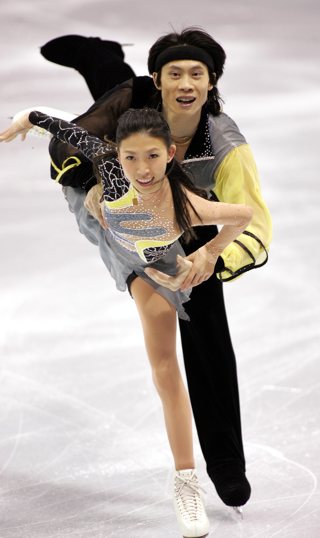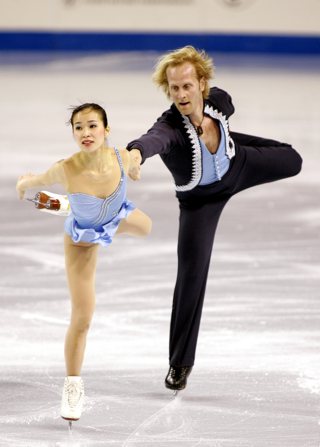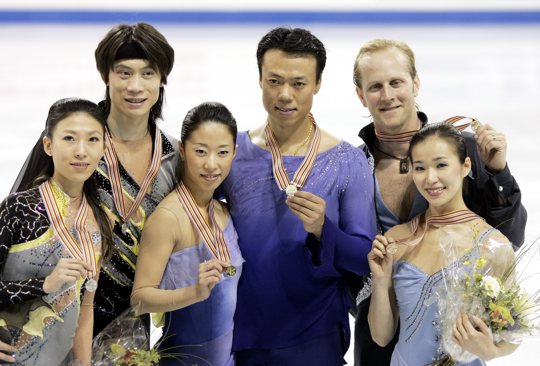Shen & Zhao
Pang & Tong
Inoue & Baldwin |
Former US pair champion, Todd Sand, and former Australian pair champion, Peter Cain, were the technical specialists for this event. 1. Skating to Romanza by Bacarisse eighth of the nine pairs from four countries, Xue Shen, 28, & Hongbo Zhao, 33, who are twice Olympic bronze medalists and twice world champions (í02 & í03) took a significant lead of 3.49 points over their Chinese teammates, the reigning world champions, Qing Pang & Jian Tong, after a splendid short program marred only by a collision landing on their triple twist. Dressed in black, she with a red ribbon on her bun, he with a red waist band, they began with solid triple toes which earned +1 GoE. That was quickly followed by a throw triple loop with spectacular air time and a soft landing which gained an even better +1.30 GoE. Their spiral sequence gained +0.71 and the back outside death spiral with change of hands +0.60. The flying change foot camel spin was graded worthy of just over base value (+0.03). All of their Level moves received the maximum, 4, except the twist, which was given only Level 1 with a minus GoE (-0.40). Their lift, which, in the race to put in as many positions as possible, had one which was somewhat inelegant, received +0.30 and their final move, the pair combination spin +0.29. 28 of their 60 component scores were 8.00 or above. The lowest were three 7.25s. The current wisdom is that it is better to try a good double twist than to risk errors on a triple because the base value of a triple isnít high enough. This was supported by a comparison of Shen & Zhao and Rene Inoue & John Baldwinís twists. (A Level 1 triple twist has the same base value, 4.50, as a Level 4 double.) The Chinese ended up with 4.10 marks for their flawed triple twist (0.40 subtracted from the base value because of the negative GoE). In comparison the Americansí double had less height but was Level 4, in part because Inoue got her arms above her head during the air time. Inoue & Baldwin were given the base value and so earned 4.50 (0.40 more than the Chinese). Talking about their mistake, Shen said, "It was not a big deal, but we were very conservative about the twist. I regret that, because our score would have been higher, probably over 70 (they scored 69.29) if we had gone for it (a higher Level). We came directly from the Asian Games (which they won for the fourth straight year). Originally we didnít want to come (to Colorado) because of the altitude. It was at high altitude that Hongbo got injured (when he ruptured his Archilles Tendon in August 2005, a very serious problem that nearly put an end to his career). We decided to come to Four Continents because we havenít performed these programs yet in Canada or the USA. After this season we want to retire, but we will see how we feel by 2009. If we are in top form we might come back for the 2010 Games." Zhao confirmed that they will not be around next season. "It is still three years until the Olympics and we want to take a break." Possibly they came to the US to market themselves and make it clear they are available for shows. Zhao had previously explained, "We want to show something new to the spectators and this season we will try some music in different style. We will tell a story of our own experience in the free skating." They will skate to Meditation from the opera Thais by Jules Massenet, which was used most famously by the first Soviet pair to win the world championship and Olympic gold, Ludmila & Oleg Protopopov. "We will show the audience how we met, teamed up and experienced happiness and difficulties together. We told the choreographer (Lori Nichol) our stories and the choreographer put all those details into the routine. As we are getting older, stamina has become our biggest problem." Shen added, "In the early years, we used the music as a background to our performance. This time, we want to our performance to set off the music. It is much different to our past routines where we used powerful music. This is slower and more rhythmic." 2. Pang & Tong, who are both 27, and are the Chinese champions, opened this event, setting a very high standard as befits their status as current world champions who are coming back from her serious illness. Dressed in identical black catsuits, they performed to Massenetís O Doux Printemps díAutrefois (O! What Sweet Springs of Yore) and were a clear second, 4.07 points above Inoue & Baldwin. "It was a quite good performance," said Pang. "There were still some little errors, and we feel that the altitude is affecting us." This past summer, she was discovered to have a serious kidney ailment, pyelitis, and they were forced to withdraw from Skate America. "My health is better than it was but Iím still not fully recvered and we need breaks in practice. My stamina is still not good." There progress was impeded by a car accident on January 1 in Beijing. "I was not wearing a seat belt," admitted Tong. "It was a head on collision and I crashed through the window. I blacked out for a little. Iím wearing a headband because of the scar. I got 16 stitches." They also began with triple toe loops (+0.14GoE). Their second move was, as usual, their highlight Ė a spectacular lateral triple twist which gained Level 2 and + 0.80. All their other levels were 4 and all eight of their elements received better than base value. Their element score was only 0.91 behind their teammates. However, the component scores were 2.58 less. 3. Inoue, 30, & Baldwin, 33, who were obviously trying to put a good face on their second dethroning in the national championships, were only 1.05 behind Pang & Tong technically but received 3.02 less for components. This was a new (International) Personal Best score. "Nationals was a nightmare," confessed Baldwin, who faced a media frenzy after revealing that he had been mugged in St. Petersburg. "Of course I didnít have a witness. It wouldnít have happened if I hadnít been alone. I thought you were supposed to speak out on these things to help others. In the end the questioning became so much, I took the story down from our website. If I had to go through it again, I wouldnít have said a word. It was all devastating. But nationals is now history and we are looking forward to worlds." They began their Soul of Spain presentation with good double Axels followed by their signature throw triple Axel. She landed on her toe and was forced to jackknife forward but the rotation was completed. Though they were saddled with a minus 0.60 GoE, they earned 6.90 marks for this move. "It feels good every time we get through the first triple Axel," said Baldwin. They now hold the record to do this move in US Nationals, in the Olympics, in the Grand Prix series and now in the Four Continents. He was not pleased, however, that their spiral sequence received only a Level 3. "That is something I havenít seen all year. We got held down on that and I want to watch the video. To do better we need to be more aggressive. I was very happy with the performance. It was one of our best. We canít control the component scores. Everybody knows there are games going on there. We just have to go home happy and feel like we skated our best." Inoue talked about the possibility of doing a triple instead of the double for worlds. "We didnít work on it after nationals because there was such a short time and there is always the possibility of injury. Weíll have a little time before worlds to work on some elements. The triple twist is something we can put effort in to, but we havenít made a decision yet. If itís ready for competition, we will do it." One thing, they also intend to work on is their back outside death spiral. Although it received a Level 4, it was given a slight -0.30 GoE. Level 4 is given, in part, because of a change of hand holds while the woman is rotation in a large circle with her head close to the ice. That change is extremely difficult and a slight change in the pressure of the hold by either partner can cause disaster. It means it is almost impossible to hold the edge after the change for the required time. 4. Valerie Marcoux & Craig Buntin, who are both 26, are coming off a very disappointing Canadians in which they lost the national title they had held for the previous three years. (They finished second.) They were 5th in the Calgary worlds after placing 11th at the Olympics. They qualified for this season Grand Prix Final where they finished fifth. They performed to Cherry Pink and Apple Blossom White, music that is more generally heard in ice dance, beginning with good triple toes which gained a +1.0 GoE. Their Level 4 double twist also got a plus though this was a lesser amount (+0.14) and their spiral sequence received +0.57. However, their Level 4 flying change foot combination spin was given a small -0.09. The Level 4 combination spin earned base score and their lift (Group 4 was specified) -0.04. Their throw triple loop got a -0.50 but the Level 2 back outside death spiral earned +0.10. However, he stumbled on a transition. She explained, "Overall weíre happy. However, we encountered timing mistakes." He said, "Each competition youíre going to find your ups and downs and you need to learn from each. Your poor performance can and should be used to your advantage. You need to get angry and use it as a lesson for future competition." On the components score, they beat Inoue & Baldwin by a fraction, 0.39, but were 1.69 behind them on the technical marks. 5. Anabelle Langlois, 25, & Cody Hay, 23, who drew to skate last, are the third ranked Canadians. With her previous partner, Patrice Archetto, Langlois competed four times in this event with a best placement of second in 2002. They skated to Mr. Monotony. They began with very good triple toe loops which earned +1.00 GoE. Their twist lift was a Level 3 double (+0.43) but she fell, slamming down nastily on her hip on their throw triple Lutz, a move they had done beautifully in Canadians. She explained, "I could feel it was wrong when I took off. I couldnít hang onto it. We were both shocked. Weíre confident in our throws. Weíve finally fallen into a rhythm. I feel at ease in throws with him. Itís a 50-50 effort." The following Level 3 spirals were given a slight minus (-0.10). Their flying change foot combination spin was a Level 3 but the remaining three moves all received Level 4 with at least the base GoE. Despite the fall, which meant a 1.0 point deduction was made, it was a new PB. But they were 4.28 points behind Marcoux & Buntin. They are trained by Lee Barkell. 6. An incredibly small 0.07 behind Langlois & Hay were Naomi Nari Nam, 21, & Themistocles Leftheris, 24, who were third in the US nationals. Nam, who teamed up with Leftheris in 2005 after injury cut short a very promising singles career, said, "We were disappointed coming off the US Championships, especially the long, but we enjoy and appreciate the pressure of competing in big competitions. It is a learning experience and the pressure will help us maintain our energy. We are proud of what we have and will continue to accomplish. Our short in Spokane was stronger and more consistent than here. Consistency is a priority to us right now. We donít have time to dwell on the past." Her partner added, "We certainly feel the altitude. Our breaths were deep and we had to fight for a deeper breath." They skated to Jacob Gadeís famous Jealousy. All but opening triple toes, their spirals and their Level 4 double twist received negatives. They lay less than a point (0.96) ahead of their teammates, Castile & Okolski. 7. The new US champions, Brooke Castile, 20, & Benjamin Okolski, 22, were third in the short program at nationals so they didnít appear too worried they were not closer to Inoue & Baldwin the pair they dethroned. She said, "We are just enjoying the moment. It isnít any different coming here as national champions. Itís about the skate and not about the title. We have dealt with the turnaround from nationals really well. We look at this as another experience and something to build on. We treat this as if it is another practice." Skating to Shine on You Crazy Diamond by Pink Floyd, they began well with a Level 3 pair combination spin, Level 2 triple twist and throw triple Salchow, all of which got positives (0.21, 0.50 & 0.60 respectively). However, she then singled her planned double Axel and he two-footed his landing. They received a very slight negative on their Level 3 change foot combination spin on his. They bettered their personal best for this section which was set in 2004 at the Junior Grand Prix in France. 8. This was an unlucky event for Jessica Dubť, 19, & Bryce Davison, 21, who skated the SP to Galicie Flamenco by Gino DíAuri. They went into the long lower than expected, 1.73 marks behind Castile & Okolski. They were 10th in the Olympics beating the then Canadian champions, Marcoux & Buntin. In worlds in Calgary, they were seventh although that was behind Marcoux & Buntin. The Four Continents was their first international this season because she had surgery on her left knee on September 25 and was off for three months. She had previously had surgery on her right knee two years ago. The duo teamed up in 2003. They recently pulled an upset victory winning the Canadian title but here, they began badly. She lost the edge of her takeoff in their triple Salchows and didnít get any rotation although the move had to be classed as a single. That meant they "earned" 0.10 for this element. They recovered to positives for their Level 3 double twist (+0.07) and Group 4 Level 4 lift (+0.26) and the base value for their Level 4 spirals. Their Level 4 back outside death spiral was given a large negative (-1.10). The throw triple loop gained base value and the last two elements, the flying camel combination spin and the pair combination spin were both Level 4 and received slight positives (+0.17 and (+0.07). They are coached by Annie Barabť, Sophie Richard & Yvan Desjardins. 9. In last place, a huge 17.30 points behind Dube & Davison were Marina Aganna & Artem Kmyazev from Uzbekistan. They skated to music from the opera La Boheme. She fell on the double Axel. Their throw was a double Axel. The lift and death spiral were Level 1. Three other moves were Level 2. The spirals were Level 3. |
||||||||||||||||||||||||||||||||||






